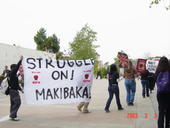" Makibaka " means " struggle " in Tagalog, the national language of the Philippines. Within it lies a sense of strength and passion within our community. This profile was created to help build a stronger network of support for Tagalog and Pilipino Studies nationwide. UC Irvine alone has over 1600 students of Filipino heritage, but has yet to establish a permanent TAPS curriculum.
Why do we need Tagalog and Pilipino Studies in our schools?
The U.S. Census Bureau reports the top three ethnic Asian groups in the country (1990):
Chinese 1,645,472
Filipino 1,406,770
Japanese 847,562
--1990 Census of Population, General Population Characteristics.
--Sacramento Bee, May 19, 1996, p.A1.
"Out From The Shadows" by Stephen Magagnini.
--Los Angeles Times, January 26, 1996, p.A1.
"Filipinos Happy With Life in U.S., But Lack United Voice" by K. Connie Kang.
-- The Asian Population: 2000 (Census 2000 Brief), February 2002.
With these numbers, why shouldn't we have it? Why do we have permanent Chinese, Japanese, Latin, Russian, or German classes in in most schools, but barely any that offer a permanent Tagalog and Philippine Studies curriculum?
